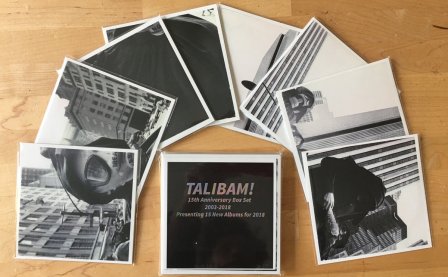Free World is a kind of nonsense. It’s a phantasmagoria, a cluster-song, a jumble of live noise and drums and samples like screeching trains and men shouting at each other and wind chimes melting, then trucks, some feedback, and a big dumb synthesizer of death. It sounds like three things at once playing off of each other, occasionally finding a minor miracle in the muck, then exploding.
It’s part two of the Launch Pad series from Talibam!, the duo of Matt Mottel and Kevin Shea, one of who-knows-how-many projects these Dadaists pick up in their spare time. The Launch Pad series started with Talibam! improvising over contemporaries like Dan Deacon, Frank Ocean, and Oneohtrix Point Never, using these artists’ very recent work as a jumping-off point for new musical directions. Part two takes these rough, scattered improvisations and molds them into something a little more proper, but no less demanding on the ears. The first half is definitely weirder, beginning as a simulated trek through a distorted urban space and ending up as a shrieking wash of dissonant cluster chords. The second half feels more distinct, with a number of interesting notions rising to the surface after a few listens: the thumb piano/synth squeak-off in the third quarter, the circular Frank Ocean “pom pom” loops, and harsh noise accompanied by a piddling bongo.
What stands out about Free World is how little one thing in particular stands out. Even in its most distinct, sort-of-memorable moments, it feels like a great big cyclone of unpredictable sound, with everything interlinked but arbitrarily — not boring, not startling either. Once the loud parts cease to surprise, you can kind of examine them for details, but then the song shifts to a new plateau. It reminds me of living in a city: the bustle of traffic, the intersecting voices, the rapidity, the variety — Talibam! accelerate through a hundred ideas in a few minutes, not even cutting them short at “boring,” but at “did that start to make sense?” Cutting through massive slices of sound, varying in dynamics, every kind of sample in the library, blurring out a rhythm with random dialogue, teasing bursts of corny SFX over a song played too quietly — anything it takes to break your ease. Since this is a rework of an already dense improvisation, it’s mostly impossible to tell the source material of the original songs, their distinct elements all blurred to gibberish by Talibam!’s frottage. Real Ideas twice removed live on as a regurgitated mess of happy accidents, deliberate choices, and utter chaos, a “corporeal interpretation” that feels narrative, chopped and composed with a very human attention span — that is, short.
Free World isn’t without direction, though. Rather, it batters your ears and demands you weather its difficult premise, pushing hard contrasts every few seconds in case you were getting comfortable. It gets a little scary, but the more I listen to it, the more emotion divorces itself from the listen altogether. Ignore the cow sound, it asks. Let semantic satiation set in, and the cow sound will become just another sound. Forget the ambulance noises; they’re just tones. Let the harshness wash over you, let it buff the wrinkles from your brain. Things should start to make sense. It’s a sound collage, but more direct and composed than it seems. It can even feel intuitive in places, even when it gets abrasive, a kind of reactionary call-and-response of different complementing tones, timbres, and reverbs, all over the map and the stereo image.
It’s interesting to hear what’s lost in translation, what develops, and to revisit Part One and imagine what other paths the band could have taken. And it is a little intimate and slightly voyeuristic to peer into the creative process like this — to see artists collaborating on or over top each other in a very immediate space, making these intuitive connections, making recursive art (from art from art, etc.), tracing out their own lines of inspiration for us to study. The idea is invigorating, captive of that sense of acceleration I can sometimes get from modern music, how quickly it seems to evolve and change, and I am sometimes filled with desire to know “how,” how an artist gets to where they are from where they started, how and when they make the decisions they do. Talibam!’s intuition as artists and improvisers speaks for itself, so as a proof of concept, Free World is an honest and resolute work. I only wish it were more fun to listen to.
I feel like things are beginning to match up when I listen, but not enough, not strongly. Some ideas are solid, but nothing worth writing home about. I feel the composition lacks clarity most of the time, where other albums were more grounded by the duo’s live instrument-playing. If I step back, I see a mess of color. Maybe if I listen enough, I can predict the future, but I feel the chaff-to-wheat ratio this time is pretty heavily chaffy. As a document of potential, it has some good spots, but in that sense, I would sooner point to Part One.
More about: Talibam!




